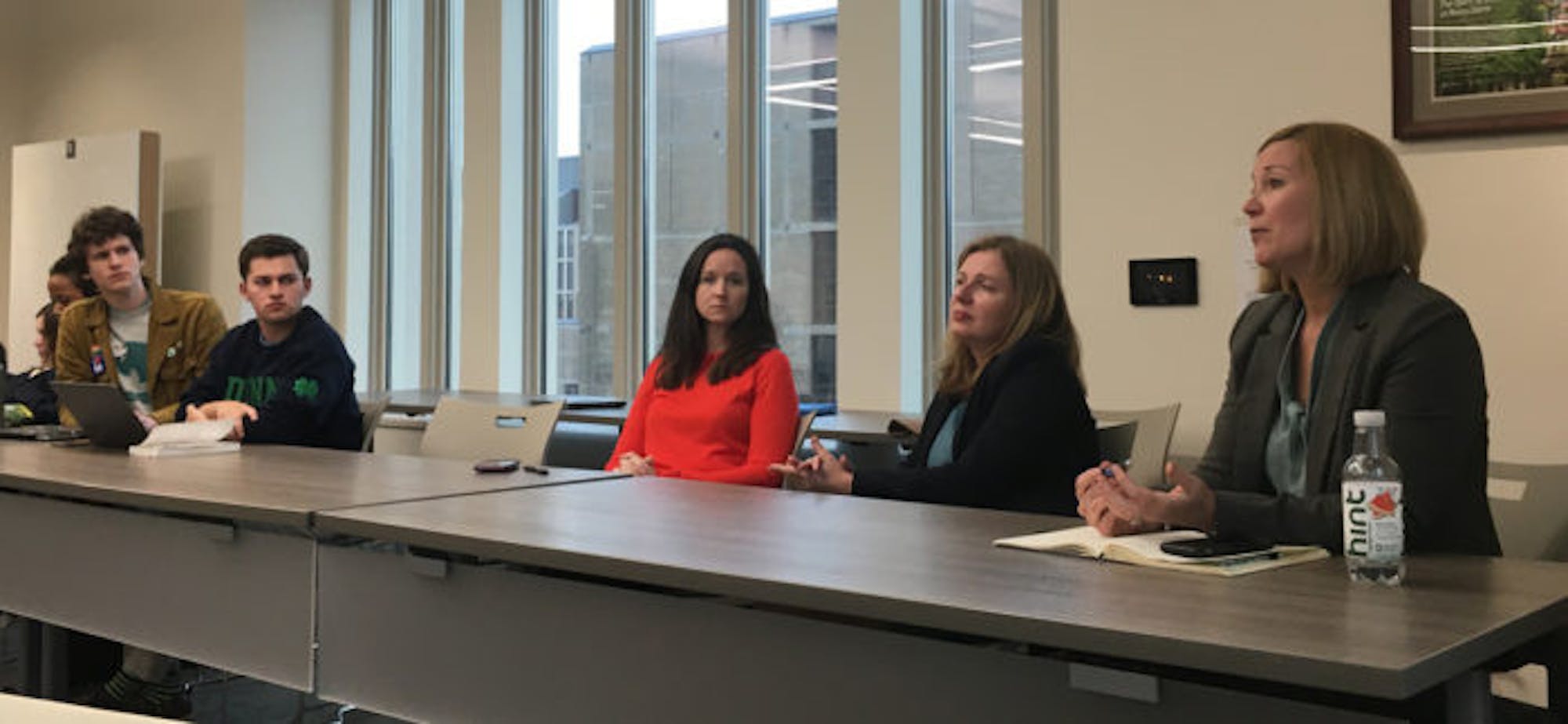Student senate was joined by associate vice president of residential life Heather Rakoczy Russell and vice president for Student Affairs Erin Hoffmann Harding for a special meeting to address recently announced residential life policies Tuesday night in Duncan Student Center.
The policies — which include incentives for on-campus seniors, enhancements for all students and efforts that differentiate on and off-campus experiences — were announced April 11 and met with major pushback from the student body.
“We didn’t call this policy the senior exclusion policy. We called this policy differentiating on and off-campus experience,” Rakoczy Russell said. “What that means is what things off-campus will have access to and the ways that they will build community will look different than how on-campus students will.”
Hoffmann Harding said the journey to the April 11 announcement began over four years ago,when Flaherty and Dunne Halls were opened to address the issue of overcrowding on campus.
“We had seen a significant increase in proportion of seniors living off-campus,” Hoffmann Harding said. “We wanted to understand how important it was for all of us to have upperclassmen leadership in those communities. As wonderful as I hope all of your hall staff are, it’s equally valuable to have upperclassmen down the hall.”
To determine the policies, officials used input from student focus groups and discussions and demographic analysis to determine trends in movement off-campus and possible factors that would entice students to say. Residential life systems at Vanderbilt University and University of Dayton were used as benchmarks, she said.
“We believe deeply that this residential experience matters — it’s part of the undergraduate education,” Hoffmann Harding said. “We think it’s something that makes us different, we hope it’s something that makes us special. We hope ultimately that it’s a place where each student feels as if they belong.”
This research led to the Sept. 2017 announcement of the six-semester residency requirement, which was announced prior to the application process of that year. A similar negative reaction to a six semester requirement overshadowed the announcement that several incentives would be announced as the first class affected by the residency requirement, the class of 2022, became upperclassmen.
Rakoczy Russell said the team did not initially plan to announce the on and off-campus differentiation policies April 11, but were urged to include it in the announcement by rectors and members of residential communities.
“We decided to tack on an extra item to the April 11 announcement, mainly so that first-year students will know that by the time they are seniors there will be a difference between the on and off-campus experience,” Rakoczy Russell said. “What that difference will be will be decided in conversation with students over the course of the next academic year with the idea that by this time next year, we can say fully fleshed out what that looks like.”
Details are still undecided regarding senior fellow positions and block meal plans, although Rakoczy Russell expects to have official practices implemented by the fall of 2021.
Rakoczy Russell said students have frequently mentioned the lack of consistency between residence halls — specifically across gender lines — in focus groups. To investigate this issue, 100% of rectors participated in an anonymous survey regarding enforcement of the policy.
“Depending on the hall, depending on the rector, the size of the community, the perceived priorities or needs of that community, there were different practices relative to each hall, some of it divided on gender norms,” Rakoczy Russell said. “What I heard from students over time was that there was great dissatisfaction not knowing what they could count on as a hallmark of a residential community.”
Rakoczy Russell said the survey found practices regarding off-campus senior differed between halls. This is a recent development, she said — about 10 years ago, some residence halls began allowing students to compete in interhall sports teams, particularly football, which eventually spread to other practices including dances. She noted future plans to send an email every August that details changes in consistency policies for that year.
Katherine Fugate, an off-campus junior who plans to stay off-campus next year, said a certain kind of student — one who lacks the “mainstream Notre Dame identity of being white, Catholic upper-class student who is heterosexual and cisgender” — may not find community in their residence hall. She cited Notre Dame’s commitment to Catholic Social Teaching, specifically preferential option for the poor, as a reason to allow those who would like to move off to do so without repercussions.
“Any conversations about inclusion also include conversations about who’s excluded from those activities,” Fugate said.
Hoffmann Harding said although individual student needs differ, student discussion groups revealed students of color and students receiving significant aid were more likely to stay on campus.
“The single biggest and most significant predictor of whether or not a student moved was actually not receiving financial aid,” Hoffmann Harding said.
As a possible solution to those who do not feel at home in their assigned dorms, the interhall transfer process was streamlined. Students are no longer required to speak with both rectors, and an exemption process — which overrides housing decisions — was put in place.
Hoffmann Harding expressed a desire to continue the conversation with students during the process of shaping the policy throughout next school year.
“As much as we regret that maybe some of our intentions were misunderstood here, I actually think it’s really exciting,” Hoffmann Harding said. “This is a conversation that matters. We know that you care. You care about these communities that you were a part of and you care about the experiences that you had there and that to me is very powerful.”













